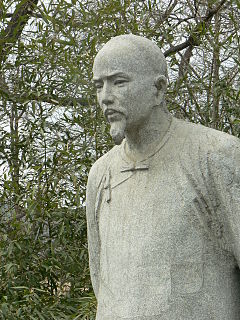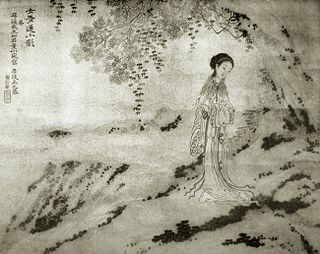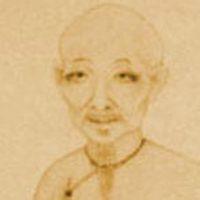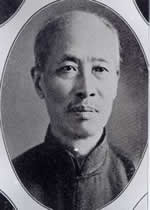 W
WCáo Xuěqín ; was a Chinese writer during the Qing dynasty. He is best known as the author of Dream of the Red Chamber, one of the Four Great Classical Novels of Chinese literature. His given name was Cáo Zhān (曹霑) and his courtesy name was Mèngruǎn.
 W
WChen Sanli aka Boyan, Sanyuan Laoren, was a Chinese poet who wrote in the classical style in the early modern era. He was descended from a Hakka family that had settled in Yining, Jiangxi Province [Kowallis, p. 169]. His father was Chen Baozhen, Qing dynasty governor of Hunan. Along with Zheng Xiaoxu and Shen Zengzhi, he became one of the leading figures of the Tongguang school, which was related to but not identical with the Song poetry style [Kowallis, pp. 168–208]. From 1889 Chen Sanli served as a civil servant, and with his father Chen Baozhen (1831-1900), the governor-general of Hunan and an associate of Tan Sitong and Kang Youwei, he led local reform in Hunan, which became a model in the minds of reformists for the entire country. After the Empress Dowager suppressed the Hundred Days Reform of 1898, the Chens were forced to leave the government and go into internal exile near Nanchang. His father died shortly thereafter, which greatly saddened the son. He then moved to a villa he built outside Jinling (Nanjing) called Sanyuan Jingshe, from which Chen Sanli derived his pen-name. After the 1911 Xinhai Revolution, Chen Sanli declined to serve in government under the Republic, but he was not a Qing yilao [loyalist] in the classic sense. After the Marco Polo Bridge Incident, he is said to have committed suicide by starvation in protest at the Japanese invasion.
 W
WCheng Jinfang (1718–1784) was a well-known poet and scholar of the Qing Dynasty who followed the Tongcheng school of literary prose. His courtesy name was Yumen (鱼门) and his pseudonym was Jiyuan (蕺园).
 W
WDong Xiaowan (1624–1651) was a Chinese courtesan, poet and writer, also known by her pen name Qinglian.
 W
WGai Qi, courtesy name Bowen 伯蕰, art names Qiliang 七郎 and Yuhu Waishi 玉壶外史, was a poet and painter born in western China during the Qing dynasty. As an artist, he was active in Shanghai. In painting his works mainly concerned plants, beauty, and figures. However he also did numerous landscapes. In poetry he preferred the rhyming ci form and added such poems to his paintings.
 W
WGao Xu, was a Chinese poet, writer, revolutionary, political activist. Gao is one of the three founders of the South Society which was the largest organization of literature and poetry during the late Qing Dynasty China and the early period of the Republic of China. Gao is also one of the founding members of Tongmenghui led by Sun Yat-sen.
 W
WGe Yunfei was a Chinese general of the Qing dynasty. He served in the First Opium War and died during the British capture of Chusan.
 W
WGu Taiqing was one of the top-ranked women poets of the Qing Dynasty. She is especially known for her ci poetry and for her sequel to the novel Honglou meng. One scholar estimates that there are as many as 1,163 surviving poems written by Gu.
 W
WHong Liangji, courtesy names Junzhi (君直) and Zhicun (稚存), was a Chinese scholar, statesman, political theorist, and philosopher. He was most famous for his critical essay to the Jiaqing Emperor, which resulted in his banishment to Yili in Xinjiang. In modern times, he is best remembered for his essay Zhi Ping Pian on population growth and its sociopolitical consequence, in which he raised many of the same issues that were raised by Malthus writing during the same period in England.
 W
WHuang Zunxian, courtesy name Gongdu (公度), was a Chinese official, scholar, and writer, active during the late Qing dynasty. As a poet, he published more than a hundred poems. He was born in Jiayingzhou, now Mei County, Guangdong, and died 57 years later in the same place. His important contributions to China made him a recognised figure of his time, and a namesake foundation has been established in his honour. Huang's former residence is now marked as a public museum.
 W
WIngen Ryūki was a poet, calligrapher, and monk of Linji Chan Buddhism from China. He is most known for founding the Ōbaku school of Zen in Japan.
 W
WJiang Shi (1818-1866) was a Chinese official and poet of the late Qing period, primarily famous for his use of simpler language within the general context of Song School poetry (Neo-Confucianism). He was also an expert in calligraphy, line drawing and Chinese brush painting.
 W
WJiang Shiquan was a Chinese poet of the Qing dynasty. He was active during the Qianlong and Jiaqing eras of the Qing dynasty, and was classed as one of the "Three Great Masters of the Qianlong Era" (乾隆三大家) along with Yuan Mei and Zhao Yi. Jiang stated that he learned from Li Shangyin when he was 15, turned to study Du Fu and Han Yu when he was 19, and studied Su Shi and Huang Tingjian at the age of 40, and abandoned the style of the ancient authors to write his own poets. He was against the restorative trend of the "Former and Latter Seven Masters" (前后七子), and disagreed with the poetry theories of Weng Fanggang and Shen Deqian. He claimed to absorb both the styles of Tang and Song. But his comprehension of "Xingling" (性灵) was different from that of Yuan Mei.
 W
WJu Chao, a native of Panyu (番禺, now Guangzhou, was a famed Chinese painter in Qing Dynasty. His courtesy name was Meisheng, and pseudonym Meichao or Guquan. He was the older brother of the painter Ju Lian. He wrote "Poems of Shouxie Shi" and "Yanyu Ci".
 W
WKong Shangren was a Qing dynasty dramatist and poet best known for his chuanqi play The Peach Blossom Fan about the last days of the Ming dynasty.
 W
WLi E, courtesy name Taihong (太鴻), hao Fanxie (樊榭), was a Qing Dynasty Chinese poet, essayist, and scholar. Known for his erudition and his poems of the "pure and spare" style, Li is recognized as one of the leaders of the Zhejiang School of poetry.
 W
WLi Xiangjun was a courtesan, singer, and musician during the Ming dynasty. Her life was dramatised in the play The Peach Blossom Fan.
 W
WLi Yin, also known by her courtesy name Jinsheng (今生) and her art names Shi'an (是庵) and Kanshan Nüshi, was a Chinese painter, poet, and calligrapher during the late Ming and early Qing dynasties, noted for her flowers and birds. Her artwork was sought after in her lifetime, resulting in as many as forty imitators in her area producing fakes of her works.
 W
WLin Xu, courtesy name Tungu (暾谷), was a Chinese politician, scholar, songwriter and poet who lived in the late Qing dynasty. He was also a student of Kang Youwei, a prominent official who was one of the leaders of a reform movement in the late Qing dynasty.
 W
WLiu E, courtesy name Tieyun, was a Chinese writer, archaeologist and politician of the late Qing Dynasty.
 W
WLü Liuliang was a Han Chinese poet and author from Tongxiang, Zhejiang province. He was born under the Ming Dynasty but died under the Manchu Qing Dynasty.
 W
WMei Qing was a Chinese landscape painter, calligrapher and poet active during the Qing Dynasty.
 W
WNalan Xingde, Manchu name Nara Singde, courtesy name Rongruo (容若), was a Qing dynasty Chinese poet, famous for his ci poetry. He was born Nalan Chengde (納蘭成德), but had to change his name when the Kangxi Emperor named Yunreng his crown prince. The character cheng (成) became taboo because it was phonetic part of Yunreng's birth name.
 W
WPan Lei was a Qing dynasty scholar. He wrote the prefaces for a number of works that appeared in his time. In the preface to writer Qu Dajun's book Guangdong Xinyu, widely regarded as a valuable source on the economic and social conditions of Guangdong in 1700, Pan wrote about the beauty, natural resources, and unique history of East Guangdong. Pan was also involved in the study of mathematics. In the preface to Mei Wending's Fangchenglun, a treatise on linear algebra written in 1690, he wrote: Although mathematics is the last of the Six Arts, it has wide applications. Without mathematics, it is impossible to understand the measurement of Heaven and the survey of the Earth; it is impossible to regulate taxes and to manage finances; it is impossible to raise armies and dispose troops; it is impossible to administer civil engineering.
 W
WQian Qianyi was a Chinese historian, poet, and politician during the late Ming dynasty. Qian was a famous author and poet; and along with Gong Dingzi and Wu Weiye was known as one of the Three Masters of Jiangdong.
 W
WQiu Jin was a Chinese revolutionary, feminist, and writer. Her courtesy names are Xuanqing and Jingxiong. Her sobriquet name is Jianhu Nüxia which, when translated literally into English, means "Woman Knight of Mirror Lake". Qiu was executed after a failed uprising against the Qing dynasty, and she is considered a national heroine in China; a martyr of republicanism and feminism.
 W
WShen Deqian, courtesy name Queshi, pseudonym Guiyu was a Chinese scholar, official, poet, critic and anthologist of the Qing dynasty.
 W
WSong Wan, also known as Song Lichang, courtesy name Yushu, was a Chinese poet and government official active during the early Qing dynasty. The son of a Ming loyalist, Song was a high-flying Qing official and well-regarded poet. Regarded as one of the "eight great Qing-dynasty poets", he died in 1673 at age 59.
 W
WSu Manshu was a Chinese writer, poet, painter, revolutionist, and a translator. His origin name is Su Jian, but Su was most commonly known as a buddhist monk, a poetry monk, and one of "the three poetry monks" in the Republic of China.
 W
WTao Zhu or Tao Shu was a Chinese scholar-official of the Qing dynasty who played a key role a broad movement toward institutional reform in the early 19th century. He is especially known for his role as Governor-General in making changes in the salt monopoly of the Qing dynasty.
 W
WTsai Ting Kan
 W
WWang Duo, is a Chinese calligrapher, painter, and poet in Ming dynasty.
 W
WWang Guowei or Wang Kuo-wei, courtesy name Jing'an (靜安) or Boyu (伯隅), was a Chinese historian and poet. A versatile and original scholar, he made important contributions to the studies of ancient history, epigraphy, philology, vernacular literature and literary theory.
 W
WWang Wu ; ca. 1632-1690 was a Chinese painter and poet during the Qing Dynasty (1644–1912).
 W
WWu Weiye was a Chinese poet and politician. He was a poet in Classical Chinese poetry. He lived during the difficult times of the Ming-Qing transition. Along with Gong Dingzi and Qian Qianyi, Wu Weiye was famous as one of the Three Masters of Jiangdong. Wu Weiye was known for writing in the ci poetry form as well as writing about current events in both the regular ci and the seven-syllable long form, the gexing.
 W
WXū Gǔ ; ca. (1824–1896) was a Chinese painter and poet during the Qing Dynasty (1644–1912).
 W
WYuan Mei was a Chinese painter and poet of the Qing Dynasty. He was often mentioned with Ji Yun as the "Nan Yuan Bei Ji".
 W
WYun Zhu or Wanglan Yun Zhu aka Adept of the Lotus Lake was a Qing dynasty poet, painter, anthologist and moralist. She gathered together thousands of poems written by hundreds of women.
 W
WYunli, born Yinli, formally known as Prince Guo, was a Manchu prince of the Qing dynasty.
 W
WZha Shenxing was a Chinese poet in the early Qing dynasty.
 W
WZhang Zhao (1691–1745), courtesy name Detian, pseudonym Jingnan, was a scholar and poet of the Qing dynasty.
 W
WZheng Xiaoxu was a Chinese statesman, diplomat and calligrapher. He served as the first Prime Minister of Manchukuo.
 W
WZhou Lianggong was a Chinese poet, calligrapher, essayist, and art historian who was born in Kaifeng and had long family ties to Nanjing.